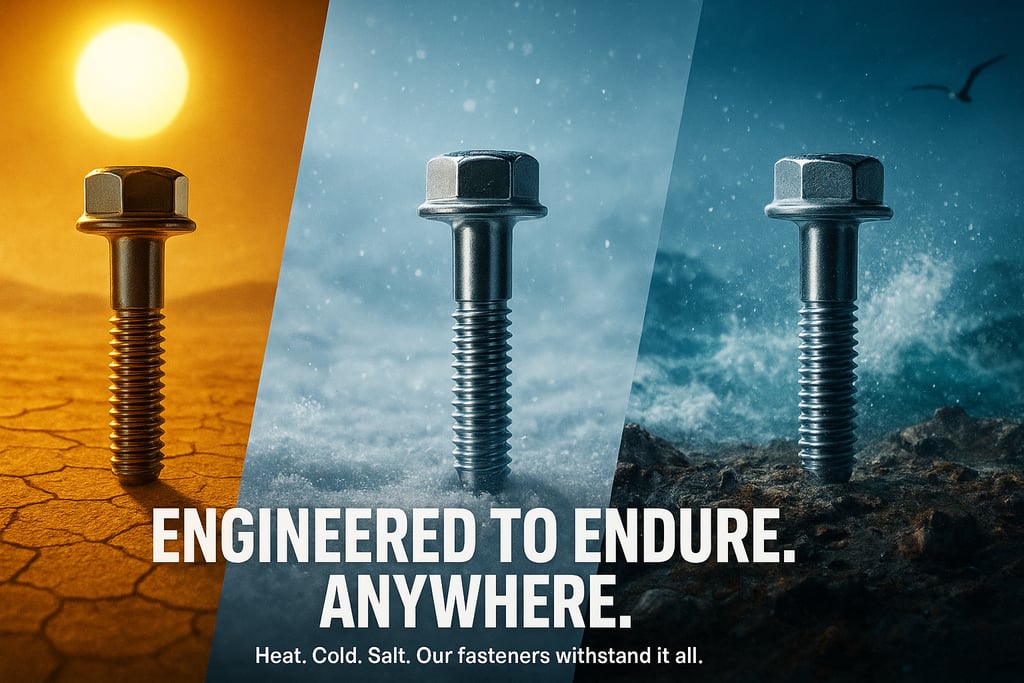HVAC Fasteners for Extreme Conditions | Heat, Cold & Moisture Resistance
Discover HVAC fasteners engineered for extreme conditions. Heat, cold, and moisture-resistant fasteners for data centers, marine, desert, and industrial facilities.
INDUSTRY-SPECIFIC SOLUTIONS


HVAC Fasteners for Extreme Conditions: Heat, Cold, and Moisture Resistance
In today's world, HVAC (Heating, Ventilation, and Air Conditioning) systems aren't limited to standard office buildings. They power data centers where every degree matters, industrial facilities where machinery runs nonstop, and even marine and desert climates where salt, sand, and heat push equipment to the limit.
At the heart of these systems are the fasteners the invisible heroes that ensure structural integrity, safety, and long-term performance. Choosing the wrong fastener can lead to premature failures, costly downtime, and safety hazards. This is why specialized HVAC fasteners for extreme conditions are essential.
Why Fasteners Matter in Harsh HVAC Environments
HVAC units face constant stress from various environmental factors that can compromise their integrity:
Heat
High-temperature operations in industrial plants and desert climates
Cold
Freezing conditions in refrigerated warehouses and polar regions
Moisture
Condensation, salt spray, and high humidity in various environments
The wrong fastener material can corrode, loosen, or snap under pressure — leading to HVAC inefficiency, costly repairs, and safety risks. Investing in the right fasteners from the start ensures system reliability and longevity.
Best HVAC Fasteners for Extreme Conditions
Selecting the right fastener material is critical for HVAC systems operating in challenging environments:
Stainless Steel Fasteners
Ideal for: Marine climates, high-moisture facilities, coastal industrial zones
Corrosion resistance against saltwater, humidity, and condensation
Long service life with minimal maintenance
Strength and stability for heavy HVAC assemblies
Hot-Dip Galvanized Fasteners
Ideal for: Outdoor HVAC systems in desert or rainy environments
Thick zinc coating provides superior rust resistance
Cost-effective compared to stainless steel
Strong load-bearing capacity for large ductwork and supports
High-Temperature Alloy Fasteners
Ideal for: Industrial facilities, power plants, high-heat HVAC systems
Withstand temperatures above 700°C
Resistant to oxidation and thermal fatigue
Ensure tight sealing under heat expansion
Coated Fasteners
Ideal for: Data centers and industrial sites requiring chemical and moisture protection
Enhanced corrosion protection (epoxy, ceramic, fluoropolymer)
Resistant to condensation and chemical exposure
Available in custom colors for easy identification during maintenance
Common Mistakes to Avoid
Steer clear of these common errors when selecting HVAC fasteners:
MistakeConsequenceSolutionUsing standard carbon steel boltsRapid corrosion in marine/desert environmentsChoose stainless steel or galvanized optionsIgnoring temperature ratingsFailure in extreme heat or freezing conditionsVerify temperature specifications before selectionOverlooking protective coatingsReduced lifespan in harsh environmentsUtilize epoxy, ceramic, or fluoropolymer coatingsPoor installation practicesVibration, loosening, and system inefficiencyFollow proper torque specifications and techniques
Step-by-Step: Selecting the Right HVAC Fastener
Follow this systematic approach to choose the optimal fasteners for your HVAC application:
1
Assess the Environment
Determine if marine, desert, data center, or industrial plant conditions
2
Determine Stress Levels
Evaluate temperature swings, humidity, and chemical exposure
3
Select Material
Choose stainless steel, hot-dip galvanized, or alloy-based options
4
Consider Coatings
Add epoxy, ceramic, or fluoropolymer coatings for extra protection
5
Verify Standards
Ensure fasteners meet ASTM, ISO, or ASME requirements
Why Bait Alnuhas is the Trusted Supplier
At Bait Alnuhas, we understand the challenges HVAC contractors face in extreme climates. That's why we supply:
Premium Quality
High-quality stainless steel, galvanized, and alloy fasteners built to last in extreme conditions
Bulk Availability
Large-scale inventory for projects like data centers and industrial facilities
Expert Guidance
Technical support to help you choose the right fastener for every HVAC environment
Whether you're building in the heat of the desert, the humidity of a marine zone, or the precision-controlled climate of a data center, Bait Alnuhas ensures your HVAC systems stay secure and efficient.
Frequently Asked Questions
What's the best fastener for HVAC systems in marine environments?
Stainless steel fasteners are the best choice due to their excellent corrosion resistance against saltwater and high humidity conditions.
Can galvanized fasteners handle desert heat?
Yes, hot-dip galvanized fasteners perform well under desert conditions and offer good resistance against sand abrasion and UV exposure.
Do coated fasteners really make a difference in data centers?
Absolutely. Epoxy or fluoropolymer coatings provide essential protection against condensation and chemical exposure in sensitive data center environments.
How often should HVAC fasteners be inspected in extreme conditions?
In extreme environments, fasteners should be inspected every 3-6 months for signs of corrosion, loosening, or fatigue, with more frequent checks in highly corrosive settings.
Professional Tip
For HVAC systems exposed to multiple extreme conditions (e.g., coastal industrial plants with both salt exposure and high temperatures), consider using stainless steel fasteners with additional specialized coatings for maximum protection and longevity.
Secure Your HVAC Systems Against Extreme Conditions
Extreme environments demand specialized HVAC fasteners. By choosing the right material and coating, you not only extend the lifespan of your HVAC systems but also ensure safety, reliability, and cost efficiency.
